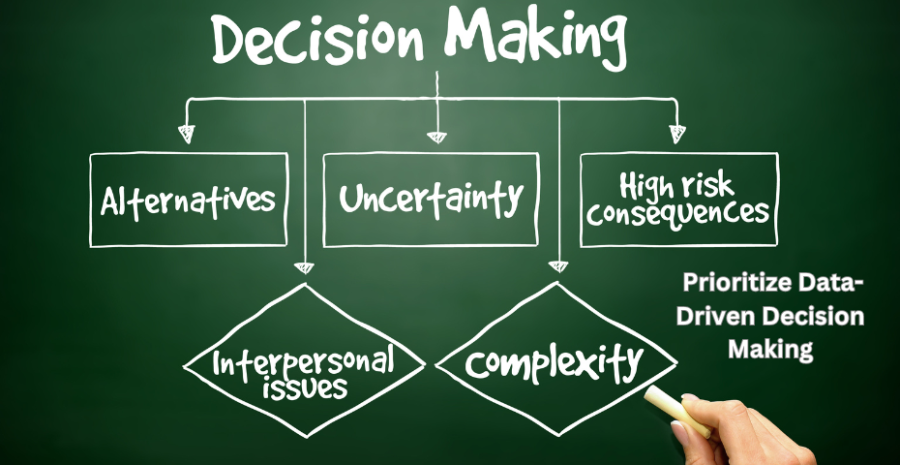

In today's fast-paced digital landscape, leadership is no longer just about managing people and processes—it's about navigating a complex, ever-evolving environment that demands agility, innovation, and a deep understanding of technology.
Traditional leadership models are being reshaped by the rapid advancements in digital technologies, requiring modern leaders to adopt new strategies and mindsets. This blog explores the essential principles that define effective digital leadership in the current era.
From embracing continuous learning and fostering a culture of innovation to prioritizing data-driven decision-making and leading with empathy, these ten new rules provide a comprehensive guide for leaders looking to excel in the digital age.
By mastering these rules, leaders can drive their organizations toward sustained success and make a meaningful impact in a world where digital transformation is the norm.

In the rapidly evolving digital landscape, continuous learning is paramount for leaders. Modern leaders must stay abreast of emerging technologies, trends, and best practices to maintain a competitive edge. This involves not only personal development but also fostering a culture of learning within their teams.
By encouraging continuous education, leaders can ensure that their organizations remain adaptable and innovative. Online courses, workshops, and industry conferences are valuable resources for keeping skills and knowledge up to date.
.png)
Innovation is the lifeblood of the digital era, and leaders must cultivate an environment where creativity and experimentation thrive. Encouraging risk-taking and rewarding innovative thinking can lead to breakthrough ideas and solutions.
Leaders should provide their teams with the tools and freedom to explore new concepts without fear of failure. This can be achieved through hackathons, innovation labs, and cross-functional collaboration. By prioritizing innovation, leaders can drive sustainable growth and stay ahead of the competition.

In the digital age, data is a critical asset that can provide valuable insights into customer behavior, market trends, and operational efficiency. Leaders must harness the power of data to make informed decisions and drive strategic initiatives.
Implementing robust data analytics tools and fostering a data-driven culture can help organizations leverage this asset effectively. Leaders should also invest in training their teams to interpret and utilize data, ensuring that decision-making processes are backed by accurate and relevant information.

Digital literacy is essential for leaders to navigate the complexities of the modern business environment. This involves understanding key digital concepts, tools, and platforms that drive organizational success. Leaders should not only be proficient in using digital tools themselves but also promote digital literacy across their teams.
Providing training and resources to enhance digital skills can improve productivity and enable more effective communication and collaboration. A digitally literate workforce is better equipped to leverage technology for competitive advantage.

Empathy and inclusivity are crucial leadership qualities in the digital era. As technology transforms workplaces, leaders must ensure that all team members feel valued and included. This involves actively listening to diverse perspectives, addressing concerns, and fostering a culture of respect and collaboration.
Leaders should implement policies and practices that promote diversity, equity, and inclusion. By leading with empathy and inclusivity, leaders can build strong, cohesive teams and create a positive organizational culture that attracts and retains top talent.

The digital landscape is characterized by rapid change and uncertainty, requiring leaders to be agile and resilient. Agility involves the ability to quickly adapt to new challenges and opportunities, while resilience is the capacity to recover from setbacks.
Leaders should cultivate these traits within themselves and their teams by promoting a growth mindset, encouraging flexibility, and providing support during times of change. By developing agility and resilience, leaders can navigate the complexities of the digital era and drive long-term success.

With the increasing reliance on digital technologies, cybersecurity has become a top priority for organizations. Leaders must be vigilant in protecting their organizations from cyber threats by implementing robust security measures and promoting cybersecurity awareness.
This includes educating employees about best practices, conducting regular security audits, and staying informed about the latest threats and vulnerabilities. A proactive approach to cybersecurity can prevent data breaches and protect the organization's reputation and assets.

In the digital age, collaboration and strategic partnerships are key to driving innovation and growth. Leaders should actively seek out opportunities to collaborate with other organizations, industry experts, and technology providers.
Strategic partnerships can provide access to new technologies, markets, and expertise, enabling organizations to achieve their goals more effectively. By fostering a collaborative mindset, leaders can leverage the strengths of their partners and create mutually beneficial relationships that drive success.

Transparency and accountability are essential for building trust and credibility in the digital era. Leaders should foster an open and transparent culture where information is freely shared, and decisions are made collaboratively. This involves being honest about challenges and successes, providing regular updates, and encouraging feedback.
Accountability ensures that team members take ownership of their responsibilities and are held to high standards of performance. By promoting transparency and accountability, leaders can build a strong foundation of trust and drive organizational success.

As digital leaders, it is important to consider the broader impact of business activities on society and the environment. Leaders should champion sustainability and social responsibility by implementing practices that reduce environmental impact and contribute to social well-being.
This can include adopting green technologies, reducing waste, and supporting community initiatives. By prioritizing sustainability and social responsibility, leaders can enhance their organization's reputation, attract socially conscious customers and employees, and contribute to a better future.
Mastering digital leadership in the modern era requires a dynamic and multifaceted approach, blending traditional leadership qualities with the demands of a rapidly evolving digital landscape. By embracing continuous learning, fostering innovation, and prioritizing data-driven decision-making, leaders can stay ahead in an increasingly competitive environment.
Enhancing digital literacy, leading with empathy, and developing agility and resilience are crucial for navigating the complexities of the digital world. Furthermore, strengthening cybersecurity awareness, cultivating strategic partnerships, promoting transparency and accountability, and championing sustainability and social responsibility are essential components of effective digital leadership.
By adhering to these ten new rules, modern leaders can not only drive their organizations to success but also create a positive impact on society. As the digital landscape continues to evolve, these principles will serve as a solid foundation for leaders to adapt, thrive, and inspire their teams toward a prosperous future.
This blog offers a comprehensive guide for modern leaders to navigate and thrive in the digital era.
(5).jpg)
About: Andries vanTonder (65)
Over 45 years selfemployed
He is a Serial Entrepreneur, an Enthusiastic supporter of Blockchain Technology and a Cryptocurrency Investor
Find me: Markethive Profile Page | My Twitter Account | My Instagram Acount | and my Facebook Profile.
